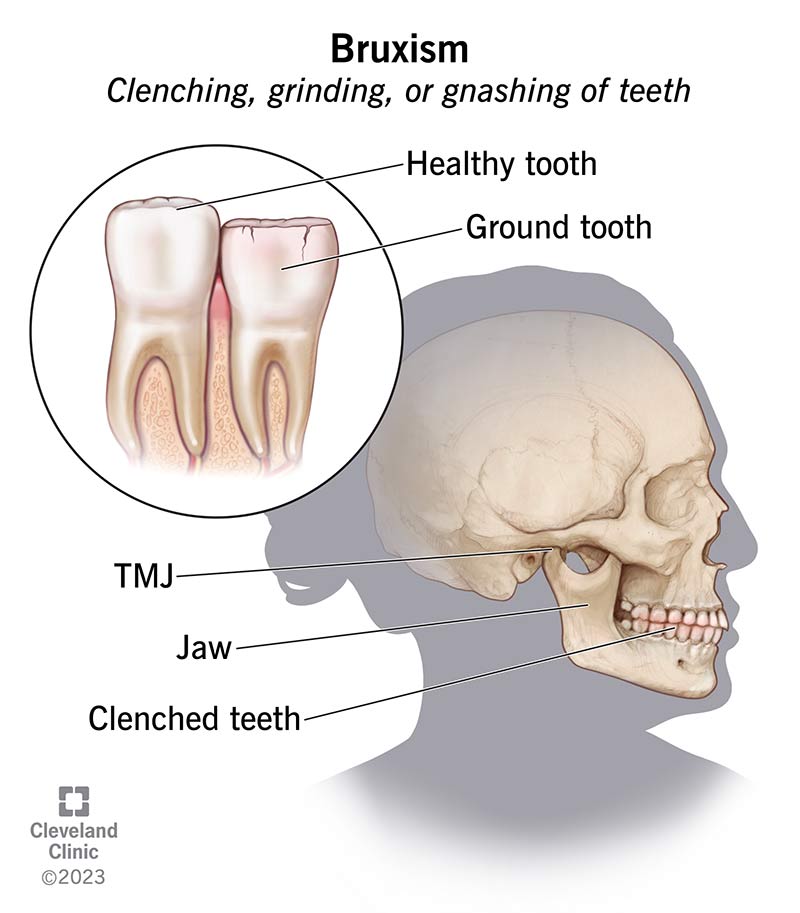Bruxism is when you clench, grind or gnash your teeth. It usually happens subconsciously, either during waking hours or when you’re asleep. Causes include stress, anxiety, sleep disorders and certain medications. Most people who grind their teeth can ease symptoms with a custom mouth guard.
Advertisement
Cleveland Clinic is a non-profit academic medical center. Advertising on our site helps support our mission. We do not endorse non-Cleveland Clinic products or services. Policy

Image content: This image is available to view online.
View image online (https://my.clevelandclinic.org/-/scassets/Images/org/health/articles/bruxism)
Bruxism is when you clench, grind or gnash your teeth. It usually occurs subconsciously, and it can happen when you’re awake or asleep.
Advertisement
Cleveland Clinic is a non-profit academic medical center. Advertising on our site helps support our mission. We do not endorse non-Cleveland Clinic products or services. Policy
Many people grind their teeth every now and then, especially during stressful times. But if you do it a lot, it can put extra strain on your teeth and jaws, leading to dental damage, headaches, jaw pain and other issues.
Anyone can develop bruxism, but it’s most common during childhood, adolescence and young adulthood. It’s difficult to know exactly how many people grind their teeth because it often happens during sleep.
If you grind your teeth a lot, you might develop symptoms like:
Bruxism can happen when you’re awake or asleep. The grinding action is the same, but awake and asleep bruxism are two separate conditions:
Advertisement
Healthcare providers don’t know exactly why some people grind their teeth and others don’t. Bruxism doesn’t have a single specific cause. Rather, there can be several contributing risk factors.
A risk factor is something that increases your chances of developing a certain condition. There are many risk factors for bruxism, including:
Left untreated, teeth grinding can lead to:
Healthcare providers (often dentists) typically diagnose bruxism based on a physical exam and your symptoms. But in some cases, you may need a sleep study (polysomnography). This overnight test takes place in a sleep center and can provide a definitive diagnosis.
If you have mild bruxism or only brux occasionally, you probably don’t need formal treatment. But in more severe cases, healthcare providers might recommend these bruxism treatments:
Advertisement
Everyone is different, but the outlook is generally good. Children often outgrow bruxism by adolescence. For adult teeth grinding, mouth guards can help. If you get one, be sure to wear it regularly.
In many cases, bruxism eventually goes away. But it’s important to know how to manage symptoms if you have a flareup. To learn more, talk to your healthcare provider.
You can’t always stop yourself from teeth grinding or clenching, especially if you brux during sleep. But there are steps you can take to reduce your overall risk:
If you develop bruxism symptoms that don’t go away — or if you have them more often than not — it’s time to tell a healthcare provider. Whether you need temporary treatment to get through a stressful period or a more long-term solution like a mouth guard, a provider can help.
It depends. If you only grind your teeth occasionally, it’s probably not a big deal. But if you do it a lot for a long time, it can lead to health issues down the road, including cracked teeth, headaches, temporomandibular joint disorder, tinnitus and other conditions.
Advertisement
Do you wake up in the mornings with pain radiating down your face? Maybe you always have headaches early in the day. Or maybe you feel exhausted from poor sleep and you’re not sure why. Any of these mysterious symptoms could point to teeth grinding or clenching (bruxism). Your healthcare provider can confirm a diagnosis and help you find appropriate treatment.
Advertisement
Learn more about the Health Library and our editorial process.
Cleveland Clinic's health articles are based on evidence-backed information and review by medical professionals to ensure accuracy, reliability, and up-to-date clinical standards.
Cleveland Clinic's health articles are based on evidence-backed information and review by medical professionals to ensure accuracy, reliability, and up-to-date clinical standards.
Dentistry plays an important role in oral health. Cleveland Clinic’s experts can design a personalized plan that will keep you smiling for the long haul.
